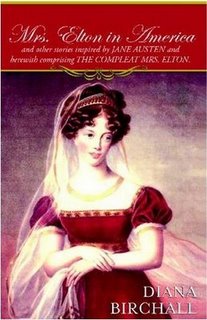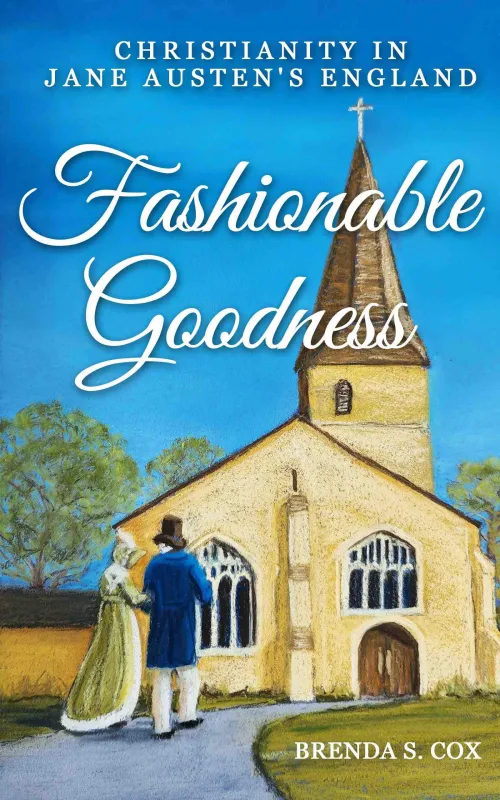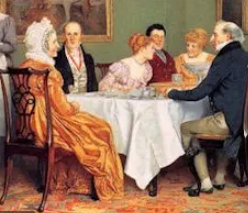On her website, Diana Birchall discusses how she began writing Mrs. Elton in America, originally entitled In Defense of Mrs. Elton.
In Defense of Mrs. Elton had an interesting evolution. It began as an internet serial told on the Janeites online literary list. The group was discussing this obnoxious character from Jane Austen’s Emma, and I undertook to defend her. My defense took the form of a serial story, told in eleven parts over the period of about a month, and the response from the geographically far-flung, but intellectually close-knit Janeites community was startling…All three “Mrs. Elton” stories are collected in the volume, Mrs. Elton in America.
Vic: Diana, I am so pleased to learn that SourceBooks has published your book, Mrs. Elton in America, a comedic novel, in which, as the publisher says, Mrs. Elton crosses the Atlantic Ocean with her caro sposo and children and enjoys high comedic adventures in Boston and New York society. She also visits a Southern slave state, and dwells among the Comanche Indians. Goodness, but Mrs. Elton gets around!
Diana: Thank you! Well, if even a quarter of those things happened, Mrs. Elton would surely be the talk of Highbury, wouldn’t she? It’s not a place where there’s a tremendous amount of action going on. Yet Mrs. Elton is an energetic character. I felt she could use a greater scope for her activity, and it might even be beneficial for her, and improve her faults. (I know more travel would definitely improve mine…)
 Vic: I’ve already written about your delight with the book’s cover , which is very lovely AND lively, but I’m sure the readers of this blog are curious to learn more.
Vic: I’ve already written about your delight with the book’s cover , which is very lovely AND lively, but I’m sure the readers of this blog are curious to learn more.
Diana: About the cover painting: I was browsing through an online gallery of the luminous, exquisite portraits by 18th century French woman artist Vigee LeBrun – a real pleasure – want to see the site? Here it is: http://www.batguano.com/vigee.html – and one face popped out at me. Remember when Jane Austen was in a gallery and “found” the portrait of Mrs. Bingley? In my less exalted case, I saw a face that said “Mrs. Elton” to me. Sort of a vulgar expression, and an over-gaudy costume. It turned out to be the Duchesse de Berry, but never mind! An earlier version of the book used a cowgirl picture, but that was never right. Now it’s right! (That is, if you think the Duchesse de Berry is Mrs. Elton. Oh well, if I’m deluded, don’t let me wake.)
Vic: Let’s face it, Mrs. Elton, though a memorable character, is not one of Jane Austen’s most beloved creations. Why concentrate on her? Why not write more about Jane Fairfax or Mary Crawford, for example?
Diana: In the first place, Mrs. Elton is funny! A character people love to hate, with a decided and distinct personality. I could never see writing about Jane Fairfax, she’s so…limp and repressed, I’ve never warmed to her. Mary Crawford, yes; a splendid wily witty Lady Susan-esque heroine. However, I identified with Mrs. Elton long ago, and there’s no help for it. She seems to have become my fate. (As Anne Elliot says in Persuasion, “It is not a very enviable one; you need not covet it.”) You know, the first time I read Emma, I couldn’t even see what was so awful about Mrs. Elton, why everyone in Highbury thought she was so dreadful. I grew up in New York and brash pushy behavior was what one saw every day, so Mrs. Elton only seemed normal! Gradually, of course, on successive re-readings, I learned to understand her social crimes, but I also found that her behavior was, in many ways, no more reprehensible than Emma’s own. The difference lies in Jane Austen’s editorial point of view, how she presents the two characters. At every opportunity she signals to us that Mrs. Elton is inappropriate, vulgar, striving for effect in her manipulations, while Emma is only young and mistaken in hers. When I wrote the first Mrs. Elton story, “In Defense of Mrs. Elton,” I came to see her side of things – that it was possible to sympathize with her, as a stranger, an outsider, so roundly and rapidly rejected by Emma, the Queen of Highbury society where she was going to live for the rest of her life.
Vic: Tell me about the impetus to write the book. Why did you decide to take the Elton family to America?
Diana: The impetus was that I’ve always been interested in transatlantic stories. Stories where an American character goes to England (as in some of Frances Hodgson Burnett’s books, for example – The Shuttle, or A Fair Barbarian), or where an English character goes to America. My main inspiration was Frances Trollope’s famous memoir, Domestic Manners of the Americans, which is jaw-droppingly brilliant journalism. Frances Trollope, Anthony Trollope’s mother, an excellent, spirited narrator and vigorous personality, went to America in the 1820s (just when Mrs. Elton would have) and wrote a vividly observed, yet extremely condescending and sarcastic description of the coarse Americans. Her viewpoint of the Americans influenced visiting authors’ attitudes ever since – I believe until this day. And I thought, what if Mrs. Elton traveled to America the way Mrs. Trollope did – what would she think of it, what would the Americans think of her, what sort of adventures would she have, how would she be changed? It just seemed like a funny idea.
Vic: You had researched Mrs. Darcy’s Dilemma extensively and worked hard on finding Jane Austen’s voice in your writing. Was the process easier with Mrs. Elton?
Diana: I’d read Jane Austen thousands of times, poring over each sentence and its beauty and balance and structure, by the time I wrote Mrs. Darcy’s Dilemma. I wanted it to be a beautiful book. I was less concerned with beauty when I started writing (or, let’s face it, “being”) Mrs. Elton. She is comedic and crass and not exquisite. Besides, by then I had developed some facility in writing in pseudo-early 19th century style. I found I could rather alarmingly snap myself into being her, and write *as* her. We are, regrettably, so very alike, after all…
Vic: Tell us a little about your writing process. Up at the crack of dawn, or writing late into the evening? Disciplined, or waiting for inspiration?
Diana: Waiting for inspiration, and when I get an inspiration, then I am driven and determined and disciplined, and just barrel away at a thing until it’s done, using every spare moment of free time. But I don’t get inspirations very often (grin).
Vic: I find your day job of reading scripts for a major movie studio fascinating. Care to share some of the details with the public?
Diana: It’s always been the ideal job for me and I know I was very lucky to have found what Dorothy L. Sayers calls my “proper job,” early in life. I’ve worked in the movie business since the 1970s, when I moved out to California after graduating from college. I had a B.A. in English, a small child to support, and was doing temp jobs. Then an aunt suggested I look up my grandmother’s old literary agent. My grandmother, Onoto Watanna, was the first Asian American novelist (she was half Chinese; I’m half Jewish; too difficult to explain), and she’d had a career as a Hollywood screenwriter in the 1920s. Her agent, a perky little man with a bow tie, was still alive, though elderly, and he gave me some scripts to read. That’s how I started, and I became what’s called a story analyst – a studio reader. I’ve been at Warner Bros since 1991, where I’m the “book person,” reading novels. Although I’m on staff I work from home, and that, of course, is ideal for a writer. Also, the work is excellent in itself, because I’m forced to work on deadline, be disciplined and professional, and turn out serviceable analytical prose every day. Very good training. As for the job itself, it’s something I have always loved doing – after thirty years I’ve never staled or got tired of it! I’m still excited each time I’m sent a new manuscript (they come via email now, which is fabulous; years ago I had to drive out to Burbank to pick up work). I love to read more than anything else in the world anyway, and even if a book isn’t one I might have chosen to read myself, I love to analyze and dissect them. And most of the books are popular novels of fairly high quality; I actually do enjoy most of them. When I don’t, I get through them quickly but professionally: you do develop the ability to read extremely fast after doing this for three decades. So It’s been a good career for me. Would I recommend it to people starting out? Not really. You see, the business is changing, with all the new technologies, and no one’s really sure which way things are going. I’m not sure it’s possible to make a career as a studio reader anymore; the system is dying out. There’ll be some new way of “covering” material, but it’s not clear yet what that will be.
Vic: Anything else you’d care to share with our readers?
Diana: Just that Jane Austen has been my teacher, my solace, my amuser, my inspiration, and my study. As Cassandra called her, “the sun of my life, the gilder of every pleasure.”
Vic: Thank you, Diana. As always your thoughts are so illuminating. You must be pleased with some of the reviews, like Ellen Moody’s, who called your book “a polished performance,” or Maggie Lane’s, who said, “It’s a delight to meet with old friends in new situations. America, where everything is bigger and better, is just the setting for the obnoxious but hugely entertaining Augusta Elton.”
Diana: Indeed, some most esteemed people have said lovely things, and I have been very pleased! Only one reviewer missed the point, that it was supposed to be, you know, funny – but then, what is fun for some, is not fun for every one. One half of the world, as Emma said, does not understand the pleasures of the other.
Vic: I can only add, good luck with the novel Diana. Two books published in one year! You must be proud.
- Please click here for my review of Mrs. Darcy’s Dilemma, Diana’s other book.
- Click here for the archives to Mrs. Elton’s current project, her weekly advice column on Jane Austen Today.








